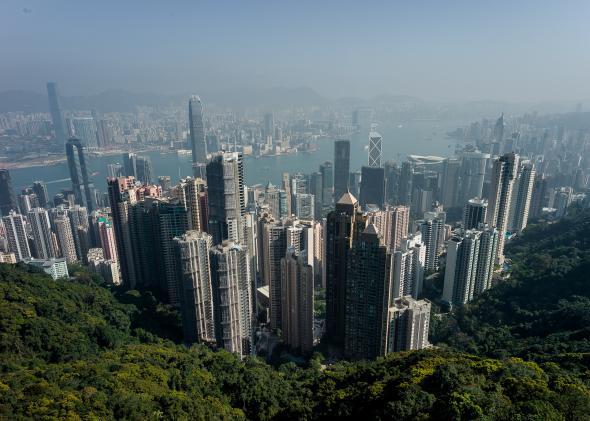In the past few days, a new missive has injected a firecracker into the debate on humanity’s long-term relationship with nature.
The “Ecomodernist Manifesto,” a document championed by the pro-gas, pro-nuclear Breakthrough Institute, imagines a different kind of environmentalism that embraces humanity’s growing demand for energy—a sharp deviation from the conventional wisdom of the eco-left. Essentially, the manifesto asks the question: What if the Anthropocene—the age of humans—is actually a good thing for the Earth, too?
Thanks to abundant energy, the ecomodernists argue, humanity has done wonderful things: Life expectancy is on the rise, infectious disease risk has plummeted, natural disasters kill fewer people, and abject poverty is on the decline. Of course, those gains have not come without sacrifice: We’re losing species at an incredible rate, and climate change could add ever more stress on human and natural systems.
The answer, according to the authors of the new document, is to “liberate the environment from the economy.” Ecomodernists argue that by focusing the human footprint into cities and prioritizing high-efficiency agriculture and energy production, we’ll be able to retreat from nature and let it recover. Now, that’s easier said than done, and likely to come with a whole set of unintended consequences, but I’m willing to give them the benefit of the doubt for discussion purposes. They list “urbanization, agricultural intensification, nuclear power, aquaculture, and desalination” as technologies that can reduce the overall human footprint and leave “more room for non-human species.”
Whether humanity will decouple the economy from our environmental overreach in time to maintain a planet worth preserving is another question. Confronted with this reality, humans of the 21st century have a choice, according to ecomodernists: further intensify our low-carbon-energy use and hope for a technological breakthrough (like sucking carbon out of the air) or retreat from modernity and risk civilizational backsliding. Their choice is clear: “We embrace an optimistic view toward human capacities and the future.”
These kinds of statements, as you might expect, are not without controversy and criticism from mainstream environmentalists:
(Kivalina, close followers of the climate apocalypse might recognize, is the name of a small native Alaskan village that is slowly sliding into the sea.)
A few of the manifesto authors are not without controversy themselves. David Keith, a Canadian environmental scientist, runs a free air carbon capture company and is an advocate of geoengineering. Roger Pielke Jr., a professor at the University of Colorado, was recently the subject of a brief congressional inquiry into the funding sources of his research, though it ultimately went nowhere. Last year, Pielke wrote a controversial post on disasters and climate change at FiveThirtyEight, forcing site founder Nate Silver to publish a rebuttal. Pielke later left the site. But these examples shouldn’t distract from what they have to say here.
Paul Robbins, director of the Nelson Institute for Environmental Studies at the University of Wisconsin–Madison, says the collection of ideas espoused in the new document couldn’t come at a better time. (He was not involved with writing the manifesto.)
Robbins believes the document is a reflection of a growing subset of environmentalists that the “people are bad” tradition of campaigning on behalf of nature is a tired and worn-out argument. Ideas like those in the manifesto are “taking up a lot of political space, because it’s persuasive and it’s a counterweight,” Robbins said.
A “manifesto” is a political document, after all. Robbins thinks it’s no accident that this one has emerged just as the 2016 presidential campaign gets underway. “They’re providing arguments for people in the middle to hold on to so they can have some kind of environmental vision,” said Robbins. The ecomodernists are aiming for a “third way” in contemporary environmentalism—they’re generally agnostic on both carbon taxes and regulation, for which they’ve drawn the ire of pretty much everyone. To further dialogue, the authors of the 32-page manifesto took the rare step of posting responses, including critiques, on their own website.
Robbins thinks the manifesto might be aimed at political centrists—like Republican Sen. Lindsey Graham and Hillary Clinton—who have prioritized the environment but weakly defined their climate and energy policies and may be looking for a broader vision. “You’ve got to have some kind of position, and they’re offering them something to jump at,” Robbins said. “It’s not like they’re going to jump on Naomi Klein’s bandwagon.”
The manifesto looks a lot like Barack Obama’s “all of the above” energy strategy, with the notable addition of a healthy dose of nuclear power and an emphasis on a global vision of humanity’s increasing energy needs. The Ecomodernist Manifesto also adds a justice component: reducing energy poverty and liberating the Earth from an unnecessarily large human footprint will reduce global inequality and foster democratic society for places largely left out of development’s riches, or so the theory goes. The world’s poor consume only a small fraction of the electricity that we do in the United States. (The average American consumes 265 times as much electricity as the average Ethiopian, according to data analyzed by the New York Times.) The authors say that needs to change, and I agree.
The United States is now on a likely permanent downward trend of carbon emissions, much of which has been credited to the rise in cheap natural gas. It’ll be hard to keep that trend going without an increased emphasis on nuclear power.
Still, after decades of hearing environmentalists rally against things (no Keystone!), the change in tone coming from ecomodernists is palpable and welcome. It’s inclusive, it’s exciting, and it gives environmentalists something to fight for for a change. Plus, the ecomodernist focus on people and planet gives the broad middle of the American public a way to embrace ethical economic growth, without having to chain themselves to a pipeline.
